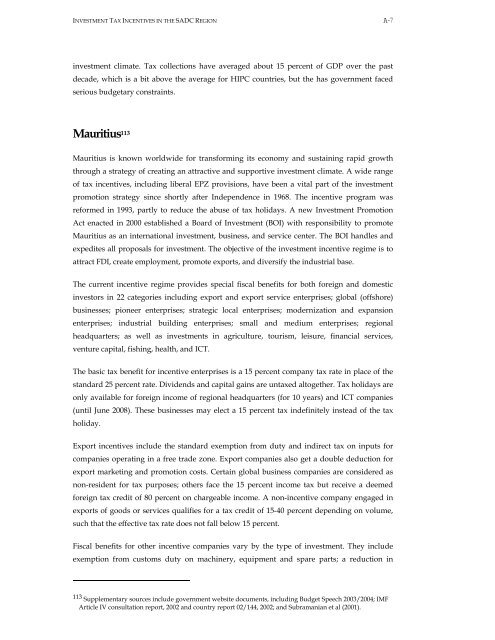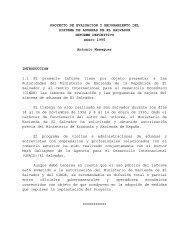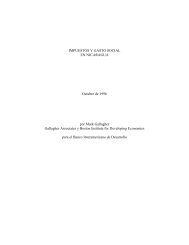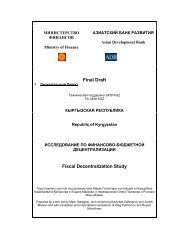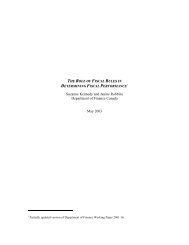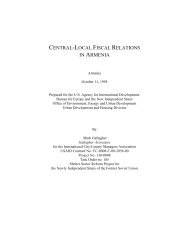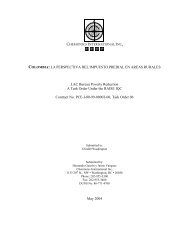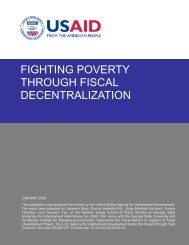Effectiveness and Economic Impact of Tax Incentives in the SADC ...
Effectiveness and Economic Impact of Tax Incentives in the SADC ...
Effectiveness and Economic Impact of Tax Incentives in the SADC ...
You also want an ePaper? Increase the reach of your titles
YUMPU automatically turns print PDFs into web optimized ePapers that Google loves.
INVESTMENT TAX INCENTIVES IN THE <strong>SADC</strong> REGION A-7<br />
<strong>in</strong>vestment climate. <strong>Tax</strong> collections have averaged about 15 percent <strong>of</strong> GDP over <strong>the</strong> past<br />
decade, which is a bit above <strong>the</strong> average for HIPC countries, but <strong>the</strong> has government faced<br />
serious budgetary constra<strong>in</strong>ts.<br />
Mauritius 113<br />
Mauritius is known worldwide for transform<strong>in</strong>g its economy <strong>and</strong> susta<strong>in</strong><strong>in</strong>g rapid growth<br />
through a strategy <strong>of</strong> creat<strong>in</strong>g an attractive <strong>and</strong> supportive <strong>in</strong>vestment climate. A wide range<br />
<strong>of</strong> tax <strong>in</strong>centives, <strong>in</strong>clud<strong>in</strong>g liberal EPZ provisions, have been a vital part <strong>of</strong> <strong>the</strong> <strong>in</strong>vestment<br />
promotion strategy s<strong>in</strong>ce shortly after Independence <strong>in</strong> 1968. The <strong>in</strong>centive program was<br />
reformed <strong>in</strong> 1993, partly to reduce <strong>the</strong> abuse <strong>of</strong> tax holidays. A new Investment Promotion<br />
Act enacted <strong>in</strong> 2000 established a Board <strong>of</strong> Investment (BOI) with responsibility to promote<br />
Mauritius as an <strong>in</strong>ternational <strong>in</strong>vestment, bus<strong>in</strong>ess, <strong>and</strong> service center. The BOI h<strong>and</strong>les <strong>and</strong><br />
expedites all proposals for <strong>in</strong>vestment. The objective <strong>of</strong> <strong>the</strong> <strong>in</strong>vestment <strong>in</strong>centive regime is to<br />
attract FDI, create employment, promote exports, <strong>and</strong> diversify <strong>the</strong> <strong>in</strong>dustrial base.<br />
The current <strong>in</strong>centive regime provides special fiscal benefits for both foreign <strong>and</strong> domestic<br />
<strong>in</strong>vestors <strong>in</strong> 22 categories <strong>in</strong>clud<strong>in</strong>g export <strong>and</strong> export service enterprises; global (<strong>of</strong>fshore)<br />
bus<strong>in</strong>esses; pioneer enterprises; strategic local enterprises; modernization <strong>and</strong> expansion<br />
enterprises; <strong>in</strong>dustrial build<strong>in</strong>g enterprises; small <strong>and</strong> medium enterprises; regional<br />
headquarters; as well as <strong>in</strong>vestments <strong>in</strong> agriculture, tourism, leisure, f<strong>in</strong>ancial services,<br />
venture capital, fish<strong>in</strong>g, health, <strong>and</strong> ICT.<br />
The basic tax benefit for <strong>in</strong>centive enterprises is a 15 percent company tax rate <strong>in</strong> place <strong>of</strong> <strong>the</strong><br />
st<strong>and</strong>ard 25 percent rate. Dividends <strong>and</strong> capital ga<strong>in</strong>s are untaxed altoge<strong>the</strong>r. <strong>Tax</strong> holidays are<br />
only available for foreign <strong>in</strong>come <strong>of</strong> regional headquarters (for 10 years) <strong>and</strong> ICT companies<br />
(until June 2008). These bus<strong>in</strong>esses may elect a 15 percent tax <strong>in</strong>def<strong>in</strong>itely <strong>in</strong>stead <strong>of</strong> <strong>the</strong> tax<br />
holiday.<br />
Export <strong>in</strong>centives <strong>in</strong>clude <strong>the</strong> st<strong>and</strong>ard exemption from duty <strong>and</strong> <strong>in</strong>direct tax on <strong>in</strong>puts for<br />
companies operat<strong>in</strong>g <strong>in</strong> a free trade zone. Export companies also get a double deduction for<br />
export market<strong>in</strong>g <strong>and</strong> promotion costs. Certa<strong>in</strong> global bus<strong>in</strong>ess companies are considered as<br />
non-resident for tax purposes; o<strong>the</strong>rs face <strong>the</strong> 15 percent <strong>in</strong>come tax but receive a deemed<br />
foreign tax credit <strong>of</strong> 80 percent on chargeable <strong>in</strong>come. A non-<strong>in</strong>centive company engaged <strong>in</strong><br />
exports <strong>of</strong> goods or services qualifies for a tax credit <strong>of</strong> 15-40 percent depend<strong>in</strong>g on volume,<br />
such that <strong>the</strong> effective tax rate does not fall below 15 percent.<br />
Fiscal benefits for o<strong>the</strong>r <strong>in</strong>centive companies vary by <strong>the</strong> type <strong>of</strong> <strong>in</strong>vestment. They <strong>in</strong>clude<br />
exemption from customs duty on mach<strong>in</strong>ery, equipment <strong>and</strong> spare parts; a reduction <strong>in</strong><br />
113 Supplementary sources <strong>in</strong>clude government website documents, <strong>in</strong>clud<strong>in</strong>g Budget Speech 2003/2004; IMF<br />
Article IV consultation report, 2002 <strong>and</strong> country report 02/144, 2002; <strong>and</strong> Subramanian et al (2001).


